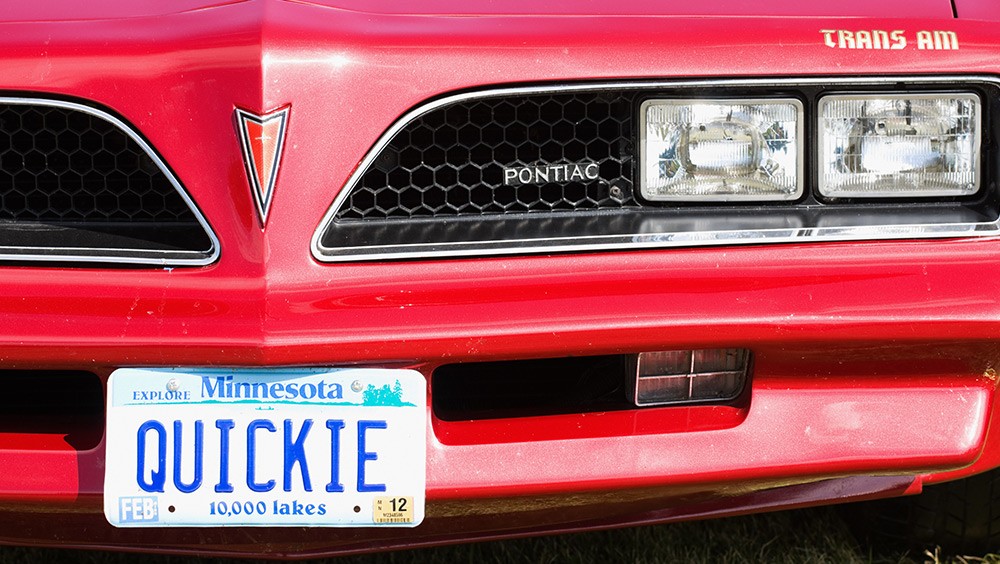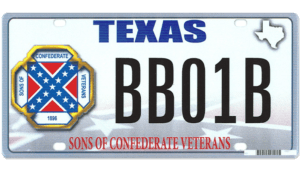Are License Plates Free Speech?

A common way that people express themselves is through messages on their license plates. Like a bumper sticker, license plates allow people to choose specific messages and images they want to express. Many people simply accept whatever license plate the state gives them, usually a seven-digit combination of letters and numbers. The plates serve as a way for the state to identify a vehicle.
Are license plates free speech?
License plates first made headlines as a free-speech topic decades ago, when Jehovah's Witnesses George and Maxine Maynard covered up the New Hampshire state motto “Live Free or Die” on their license plate. Local officials fined the Maynards for affixing a piece of red tape over the motto.
The Maynards lost their case and were ordered to pay fines in state court. Then, they filed a First Amendment challenge in federal district court. A three-judge district court ruled against the state of New Hampshire, prohibiting the state from further punishing the Maynards for affixing red tape on their license plates. The state then appealed to the U.S. Supreme Court.
The Supreme Court explained in Wooley v. Maynard (1977) that the state of New Hampshire unconstitutionally compelled the Maynards to support a specific ideological message or viewpoint. The court viewed the Maynards’ act as similar to a case from decades earlier in West Virginia Board of Education v. Barnette (1943), when the court held that public school officials unconstitutionally compelled young Jehovah’s Witness schoolchildren to salute the American flag and recite the Pledge of Allegiance in violation of their beliefs.
🚙 April 14, 1977: the USSC rules, in Wooley v. Maynard, that NH citizens have the constitutional right to conceal the state motto "Live Free or Die" on their license plates. pic.twitter.com/DL3Stlfu4f
— Law Office of Justin R. McCarthy (@jrmccarthy_law) April 14, 2023
In ruling on the Maynards’ license plate case, Chief Justice Warren Burger said that “we are faced with a state measure which forces an individual, as part of his daily life — indeed constantly while his automobile is in public view — to be an instrument for fostering public adherence to an ideological point of view he finds unacceptable.” The case stands for the principle that the state cannot force someone to believe certain things.
But today’s license plate free-speech disputes are different. Now, the question is whether government officials can limit particular types of messages that people and organizations attempt to convey through their license plates. There are two specific types of license plates in which individuals can express messages: specialty license plates and vanity, or personalized, plates.
Are specialty license plates free speech?
In many states, organizations or individuals may apply to design a so-called specialty license plate that receives state approval. These license plates have a logo or message on them. These specialty plates still include a unique, government-assigned license plate number and letter combination.
A dispute over specialty license plates reached the U.S. Supreme Court. The Sons of Confederate Veterans applied in 2009 for a specialty license plate in Texas. The group designed their plate, which featured a picture of the Confederate Flag, and sent it for state approval. The Texas Department of Motor Vehicles Board denied the request, stating that “many members of the public find the design offensive.”

This image, provided by the Texas Department of Motor Vehicles via the Associated Press, shows the design of a proposed Sons of Confederate Veterans license plate.
The Sons of Confederate Veterans sued, contending that the state had committed viewpoint discrimination by denying its specialty license plate based on the perceived offensiveness of the Confederate Flag. The state countered that its specialty license plate program was a form of government speech.
In First Amendment law, the government can speak for itself and engage in its own expression. If speech is declared government speech, the state is immune from a First Amendment challenge by a private party. Thus, the court had to decide whether Texas violated the First Amendment by discriminating against the speech of the Sons of Confederate Veterans or whether the state’s specialty license plate program was a form of government speech.
Supreme Court says specialty license plates are not free speech
A sharply divided Supreme Court ruled 5-4 in 2015 that the specialty license plate program was a form of government speech – and so the plate design could be rejected. Writing for the majority, Justice Stephen Breyer reasoned that history established that “license plates have long communicated messages from the States.” He also reasoned that the public often associates specialty license plates with the government, and that these plates are simply a form of government identification. Breyer also noted that “Texas maintains direct control over the messages conveyed on its specialty plates.”
RELATED: What speech is (and isn't) protected by the First Amendment?
Justice Samuel Alito wrote a powerful dissenting opinion, warning that the majority’s “capacious” application of the government speech doctrine could threaten free speech. Alito wrote the following:
"Here is a test. Suppose you sat by the side of a Texas highway and studied the license plates on the vehicles passing by. You would see, in addition to the standard Texas plates, an impressive array of specialty plates. … As you sat there watching these plates speed by, would you really think that the sentiments reflected in these specialty plates are the views of the State of Texas and not those of the owners of the cars?"
Alito reasoned that a normal person viewing a specialty license plate would associate the message on the plate more with the driver or owner of the vehicle, than the state.
Importantly, the Supreme Court also noted in a footnote that its decision was confined to specialty license plates, not vanity plates.
Are vanity license plates free speech or government speech?
Vanity plates, also known as personalized plates, involve more personal speech than specialty plates. A vanity plate’s message is chosen by the owner of a vehicle and is unique to that specific owner. The owner selects a specific letter or number combination to be their license plate number, rather than accepting a random government-assigned plate number.
First Amendment disputes also arise with vanity plates. First, government officials still claim – usually unsuccessfully – that vanity plates are also a form of government ID and thus are government speech. Most lower courts have rejected this argument, realizing that a vanity plate is nearly akin to a bumper sticker. It involves a great deal of individual choice by a driver. Furthermore, other drivers and people in public normally associate a vanity plate with the owner of the vehicle, not the state. As Mary S. McElroy, a U.S. District Judge in Rhode Island, explained in Carroll v. Craddock (D.RI. 2020), “The very essence of vanity plates is personal expression.”
Can vanity license plates be regulated?
The other First Amendment dispute with vanity plates is whether the state can regulate the vanity plates — even though they are private speech — if they are offensive. In many states, a law allows the department of motor vehicles to deny plates that are “offensive to good taste or decency.” Other states deny plates that are “obscene or profane.” Still other states will deny plates that include a registered trademark. Most of the vanity plate disputes that go to court involve denials of plates that are deemed too offensive.
RELATED: Is obscenity protected by the First Amendment?
Rhode Island denied the vanity plate “FKGAS” because they said it violated the state standard against plates that are “offensive to good taste or decency.” The reviewing federal district court noted that the state’s department of motor vehicles had not allowed vanity plates with the following messages: AIDS, GAY, JESUS, LESBIAN, REDNECK and YANKEE. However, the same department of motor vehicles had allowed vanity plates with these messages: CHRIST, JEWISH, REDNEC, and REDNEK.
Ultimately, the federal district court ruled that Rhode Island officials likely violated the First Amendment when they denied the plate “FKGAS” because the officials had engaged in impermissible viewpoint discrimination. The court granted the driver relief and ruled against the state.
Similarly, a federal district court in Kentucky ruled that state officials violated the First Amendment when they denied a man’s request for the vanity plate with the message “IM GOD.” The court explained in Hart v. Thomas (2019) that the state law on personalized plates allowed states to ban vanity plate messages that contained religious references. But the federal district court ruled that this clearly violated the First Amendment.
Tennessee woman sues after state officials deem vanity license plate 'offensive'!
— D. Scott @eclipsethis2003 (@eclipsethis2003) July 2, 2021
Leah Gilliam is an astronomy buff and a gamer with the license plate '69PWNDU'!
What say You? Offensive or No? 🤔 pic.twitter.com/GTwRvTVKWP
In Tennessee, Leah Gilliam applied for and received the vanity plate “69PWNDU.” She had the plate for nearly a decade until 2021 when someone connected with the state viewed the plate on the road and deemed it too offensive. The state then revoked her plate.
Gilliam sued, alleging a First Amendment violation. A Tennessee trial court found that the vanity plate was a form of government speech, not Gilliam’s own speech. However, the Tennessee Court of Appeals reversed the decision in Gilliam v. Gerregano. “Messages on personalized vanity license plates are private, not government, speech,” the appeals court ruled.
Tennessee has appealed the case to the Tennessee Supreme Court. The state high court heard oral arguments in the case on April 3, 2024, with a decision expected sometime later in the year.
What’s the bottom line on license plates and free speech?
License plates have led to a surprising array of First Amendment cases and controversies. People feel passionate about their plates, particularly the personalized message on a vanity plate. The Supreme Court has yet to decide a vanity plate case, but ongoing disputes over license plates make it likely that such a case will reach the court in the near future.
David Hudson is a First Amendment fellow with Freedom Forum.
5 Things to Know for Free Speech Week
Why New Utah Social Media Laws Are Unconstitutional
Related Content
$30,000 Giving Challenge
Support the Freedom Forum’s First Amendment mission by Dec 31st and double your impact.

